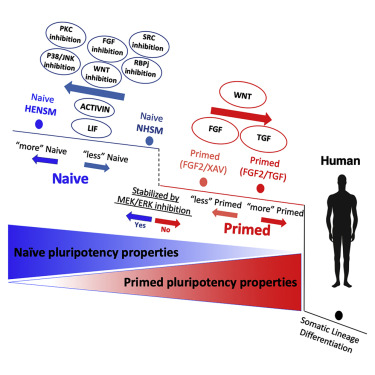Being able to generate all cell types, mouse embryonic stem cells are a most valuable tool for research. They can be found in the developing mouse embryo in two distinct states: naïve – in the blastocyst, and primed – in the post-implantation epiblast. These two states are distinct in various aspects, most notable, only naïve cells can contribute efficiently to chimera. Naïve and primed cells can be sustained in-vitro, and are dependent on distinct signaling. In human, naïve stem cells were out of reach for a long time. We investigate the regulation of naïve and primed pluripotent stem cell in mouse and human. Specifically, we were able to maintain human stem cells in a “naive” state, with distinct molecular and functional properties, including enhanced ability to contribute to cross-species mouse chimeric embryos (Gafni et al, 2013). In addition, we found that mRNA methylation has a critical role in facilitating degradation of pluripotent genes, an essential step during the switch from naïve to primed states, both in-vitro and in-vivo (Geula et al, 2014). In a more recent paper we improved the human naive media conditions and showed that triple inhibition of SRC, PKC and WNT, consolidates human naive pluripotency induction.
